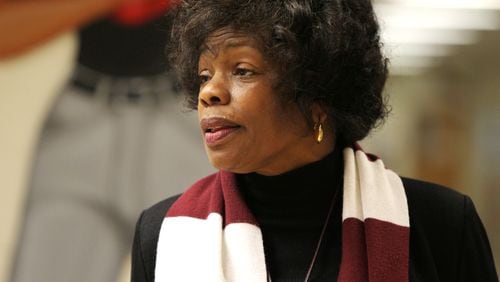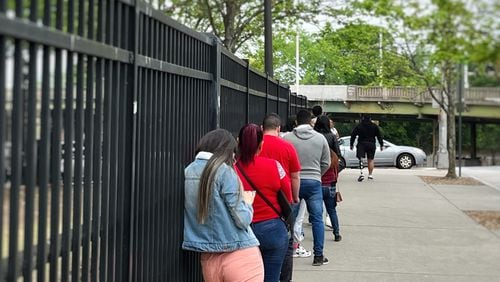Marcene Thornton never wanted to be anything other than a teacher.
As a child, the avid reader and crossword puzzle fan gave tests and assigned essays to her younger siblings after school. As an adult, Thornton presided over classrooms, and later, entire schools in her home city and spent her career as a much-beloved educator with a knack for turning struggling schools around.
Thornton didn’t shirk difficult assignments, even in the face of tragedies, such as the sudden death of her husband, Harry, in 2015, and the murder of her only child, Ryan, who was fatally shot by a food delivery driver in 2018.
Thornton died August 10 at the age of 73. A memorial service was held Friday, Aug. 18, at Murray Brothers Funeral Home in southwest Atlanta.
Family members and former colleagues remembered the former Carver Early College principal as a passionate educator who would stand in the school lobby each morning and greet students. “Miss Thornton,” as students called her, was a demanding mentor, but gave far more than she demanded.
“She was very firm. She had very high expectations. And I think that molded a lot of us into the scholars that we are because she was very zero-tolerance for foolishness,” said Shanice Farmer, a former Carver Early College student who was inspired by Thornton to become a teacher.
But when Farmer came to school basketball games with her younger siblings, Thornton told the teenager she’d watch over them so Farmer could be with her friends.
Thornton worked 47 years for Atlanta Public Schools, the same system she’d attended as a child. She graduated in the top 10% of her class at Booker T. Washington High School, and later, from Spelman College, where Thornton earned a bachelor’s degree in education.
She taught primary and secondary school and served as a reading specialist before being named principal of Capitol View Elementary School. In 2004, she won plaudits for overseeing test score improvements and attendance records that earned Capitol View a No Child Left Behind Blue Ribbon Award.
The following year, Thornton was named Carver Early College’s first principal. The college preparatory school was one of four schools created from the former George Washington Carver Comprehensive High School. Together the separate schools, including Carver Tech, formed the New Schools at Carver.
In 2014, Newsweek named Carver Early College one of the 75 best schools in the nation and the fifth best school serving an economically disadvantaged community. And yet, Thornton demurred when presented such accolades.
“She didn’t want any recognition for doing what she loved. She loved teaching,” said Marsharn Rossell, Thornton’s brother. “She probably would have done it for free.”
Along with Rossell, Thornton is survived by three sisters: Celestine Rossell Tory, Mavis Rossell and Zadie Rossell Culpepper.
Thornton succeeded, in large part, because of her authoritative “motherly-grandmotherly” presence and insistence on remaining highly visible to students, recalled Atlanta City Councilman Matt Westmoreland, who taught at Carver under Thornton.
“She was a force of nature,” Westmoreland said.
Westmoreland said Thornton’s morning practice of fist-bumping, high-fiving and hugging students, which he did with her, served a much greater purpose than PR.
“It served as a really smart strategy to be able to discern how each student was doing, who was, say, coming to school angry, upset about something that happened at home, or had just gotten into an altercation with another student or family member,” Westmoreland said.
Thornton’s biggest challenge came in 2016 when she was called on to preside over a planned merger of her school with Carver Tech. It was a blending of the system’s crown jewel — her school that pulled in high achievers where nearly every student went to college — with one that had repeatedly earned an “F” from the state.
The merger, which virtually no one wanted, was an attempt to stave off a state takeover of Atlanta schools after a cheating scandal had rocked the system.
Former Atlanta Schools Superintendent Meria Carstarphen recalled tearfully the moment she asked Thornton to take on the assignment.
“I will do this,” Thornton replied in a calm, determined voice, Carstarphen recalled. “That moment changed me,” Carstarphen said.
Thornton helped significantly pull up Carver Tech students’ graduation rates, she said.
“It was so incredibly humbling,” Carstarphen said. “I just couldn’t have done it (the merger) without her.”
“She really was a servant-leader.”






